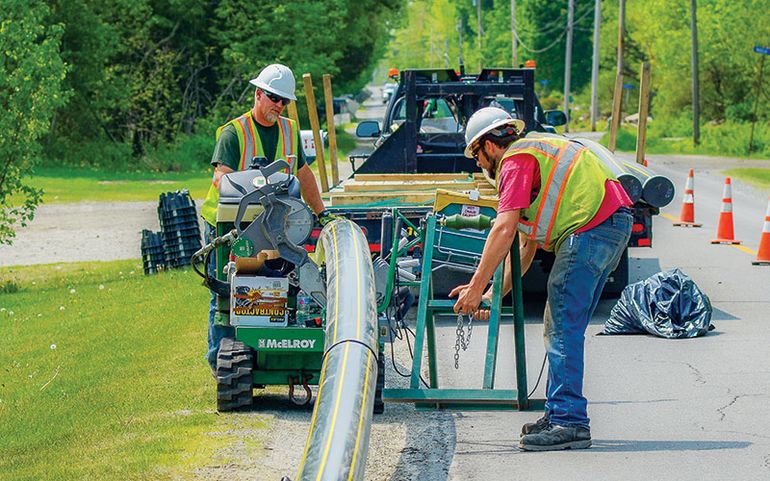Summit Natural Gas of Maine project nears the five-year finish line
 Courtesy / Summit Natural Gas
Summit Natural Gas of Maine as laid 250 miles of pipe in the Kennebec River valley, including in Sidney (pictured), and in Cumberland County.
Courtesy / Summit Natural Gas
Summit Natural Gas of Maine as laid 250 miles of pipe in the Kennebec River valley, including in Sidney (pictured), and in Cumberland County.
When Summit Natural Gas of Maine in February announced it was going to lay more than 46,000 feet of pipe in Sidney, it marked a milestone of sorts for the Augusta-based company.
The $340 million project has laid more than 250 miles of pipe up the Kennebec River valley and in the Cumberland-Yarmouth-Falmouth area since it began in 2013.
The pipeline includes 192 miles of distribution and 68 miles of transmission underground steel pipes.
When it formed as a subsidiary of Colorado-based Summit Utilities, it promised to invest $350 million in pipeline up the Kennebec River Valley in five years.
The project at the time it was proposed was the most extensive gas network ever in the state, which is heavily dependent on oil.
But the plan hit obstacles. There were issues with subcontractors, competition from Maine Natural Gas, less interest from residents in some communities than it had anticipated when oil prices dropped and fines from the Maine Public Utilities Commission.
The backbone of the line, as first proposed, runs from Pittston 68 miles north up the Kennebec, as well as the smaller Falmouth-Cumberland-Yarmouth network. The model includes signing on anchor businesses or other large customers, as well as residential users in the communities that approved the line.
Summit doesn't release customer numbers, but despite the setbacks, it is operational along the backbone it first proposed, with a large network of its users in the Augusta-Waterville area.
Major customers include the Sappi mill in Skowhegan, the city of Augusta, Backyard Farms in Madison and municipalities along the line. Summit was also part of Waterville's Trafton Road industrial project expansion, which included a new exit on Interstate 95.
The Sidney expansion is in partnership with Pike Industries, which is converting its Lyons Road plant from oil to natural gas.
“Pike Industries is continuously looking to expand our energy options,” says Kevin Folkins, liquid energy manager. “Part of our sustainability strategy is to seek opportunities to optimize our energy use and resources. We are investing in our Sidney plant to reduce the amount of energy required in our production process and are excited to add the ability to use a cleaner fuel.”
Summit has already committed to bringing pipeline down several residential streets in the town, which is between Augusta and Waterville along the Kennebec.
“With the backbone of the system now in the ground, we are focusing on infill in our service territories while also partnering with the communities we service on economic development opportunities,” says Lizzy Reinholdt, director of corporate affairs.
Read more
Isle au Haut to build solar-powered smart energy microgrid
Expanded energy training center signals growing demand for skilled technicians
Fiberight waste-to-energy site to convert tons of trash to energy or recycling
CMP aims to deliver Canadian hydropower to Bay State utilities by 2022
Maine Aqua Ventus offshore wind power project faces delays, uncertainty
Maine colleges continue to tackle energy sustainability
Islands aim for energy independence
Electric vehicle public infrastructure coming to Maine as state reduces dependence on fossil fuels
Isle au Haut to build solar-powered smart energy microgrid
Expanded energy training center signals growing demand for skilled technicians
Fiberight waste-to-energy site to convert tons of trash to energy or recycling
CMP aims to deliver Canadian hydropower to Bay State utilities by 2022
Maine Aqua Ventus offshore wind power project faces delays, uncertainty
Maine colleges continue to tackle energy sustainability
Islands aim for energy independence
Electric vehicle public infrastructure coming to Maine as state reduces dependence on fossil fuels










Comments